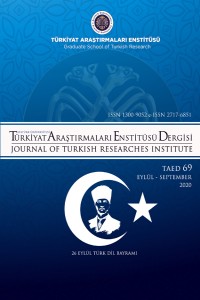Öz
Abstract
War is a major disaster that leads to the destruction of the societies from all aspects. And the Turkish War of Independence caused the Turkish Republic which was on the foundation phase to start from the very beginning. Most of the scholars who were educated thanks to the reforms implemented in the downfall period of the Ottoman Empire, had died in the Independence War. For the development of the newborn country one of the main factors to be improved was education together with economy. In order to succeed this development, it was necessary to educate the people whose 80 percent lived in rural areas, and this education should have directed people to production in all aspects. But in spite of all the laws and regulations implemented, desired level of success could not have been reached. One of the reasons of this failure was to try to understand and expalin the rural life from the viewpoint of city life. At this downturn Makal, indited his masterpiece “Bizim Köy” which shows the facts that it was needed to see the city life from the viewpoint of rural life and describes the village reality as it was. The factors that lead “Bizim Köy’’ to attract attention to the highest levels of the State, were Makal’s growth in the village and to observe the peasent and the village reality well while teaching in villages.
In this study, Mahmut Makal’s usage of folklore and folk culture elements in his masterpiece named “Bizim Köy” have been observed. These elements are classified as main and subtitles and include samples with page numbers. Makal has been seen as the victim who lived exactly from birth what he told as much as the narrator in “Bizim Köy”. Makal’s Bizim Köy is an important masterpiece which transfers the village truth without fret and also represents a trend which will be called ‘’village literature ‘’ after years. As a result of this study, thanks to the fact that Makal was a village boy and he reflected his observations with all their reality, in “Bizim Köy” someone can see quite a lot elements of that period such as language, clothing, beliefs, games and entertainment.
Anahtar Kelimeler
Mahmut Makal, Bizim Köy, Folklore Elements, Village Literature
Kaynakça
- Başaran, M. (2008). “O köy bizim köyümüzdü…” Radikal Gazetesi http://www.radikal.com.tr/kitap/o-koy-bizim-koyumuzdu-860574/
- Bayrak, M. (1978). Köy Enstitülü Yazarlar, Ozanlar. Ankara: TÖB-DER Yayınları.
- Beryl P. (1939). Türkiye’de İlk Tahsil Hakkında Rapor, T.C. Maarif Vekilliği Ana Programa Hazırlıklar, Seri. B, No.4, İstanbul: Devlet Basımevi.
- Dündar, A. (1995). Şeriata Karşı Laik Eğitim Özgür Toplum. Ardıç yayınları.
- Erbaş, G. (2019). Mahmut Makal’ın Hayatı, Sanatı ve Edebî Eserleri. (Yayımlanmamış Yüksek Lisans Tezi). Kütahya Dumlupınar Üniversitesi, Sosyal Bilimler Enstitüsü.
- Gürsel, Ö. Tekergül, E. Turan, K. Toraman B. Karagöz, Ö. Güldaş, M. (2009). “Cumhuriyetin İlk Yıllarında Bir Eğitim Modeli Köy Enstitüleri”, 1. İnşaat Mühendisliği Eğitimi Sempozyumu.
- Kocabaş, K. (2019). “Mahmut Makal: ‘Canlandırılacak Köy’den ‘Bizim Köy’e”. KitaP Dergisi.
- Kut, D. (2000). 60 Yılda Basında Köy Enstitüleri, Ankara: Gülikeni Yayınları.
- Makal, M. (2008). Bizim Köy. İstanbul: Literatür Yayınevi.
- TDK, (2020). https://sozluk.gov.tr/ Yıldız, N. Akandere, O. (2017) “Köy Enstitülerinin İdeolojik Yapısı”, Journal Of Modern Turkish History Studies, XVII/35 (2017-Autumn).
Öz
Savaş ülkelerin her yönden yıkımına yol açan büyük bir felakettir. Kurtuluş Savaşı da kuruluş aşamasındaki Türkiye Cumhuriyeti’nin her şeye sıfırdan başlamasına sebep olmuştur. Osmanlı Devleti’nin son döneminde gerçekleştirilen reformların yetiştirdiği beyinlerin çoğu bu savaşta şehit olmuştu. Kurulan Türkiye Cumhuriyeti’nin kalkınmasında başta ekonomi olmak üzere acilen düzeltilmesi gereken unsur eğitim sistemiydi. Bu kalkınmanın sağlanması için de %80’i kırsalda yaşayan halka her alanda eğitim vermek ve bu eğitim sonucunda yine her alanda halkı üretime geçirmek gerekiyordu. Fakat yapılan tüm kanun ve uygulamalara rağmen istenilen başarı düzeyi yakalanamamaktaydı. Bu başarısızlığın sebeplerinden biri şehirden kırsalı anlama ve anlatmaya çalışmaktı. Bu sıkıntılı dönemde Makal, istenilenlerin elde edilebilmesi için köyden şehre bakılması gerektiğini gösteren ve köy gerçekliğini olduğu gibi aktaran “Bizim Köy” adlı eserini kaleme almıştır. “Bizim Köy”ün devletin en üst kademelerine kadar dikkatleri çekmesindeki etken, Makal’ın köyde büyümesi, köylerde öğretmenlik yaptığı dönemde köylüyü ve köy gerçekliğini iyi gözlemlemesiydi.
Bu çalışmada Mahmut Makal’ın “Bizim Köy” adlı kitabında yer alan halk bilimi ve halk kültürü unsurlarının kullanımı incelendi. Bu unsurlar ana ve alt başlıklar olmak üzere tasnif edilerek örneklemelere sayfa numaralarıyla birlikte yer verildi. Makal “Bizim Köy”de anlatıcı olduğu kadar, anlattıklarını birebir doğumundan itibaren yaşamış bir kurban olarak görülmektedir. Makal’ın “Bizim Köy”ü köy gerçeğini perdesiz bir şekilde aktaran, daha sonra “köy edebiyatı” olarak adlandırılacak bir akımı da temsil eden önemli bir eserdir. Çalışmanın sonucunda Makal’ın da bir köy çocuğu olması ve gözlemlerini tüm geçekliğiyle yansıtması sayesinde “Bizim Köy” de dönemin diline, giyimine, inanışlarına, oyun ve eğlence gibi halk unsurlarına oldukça rastlanmıştır.
Anahtar Kelimeler
Kaynakça
- Başaran, M. (2008). “O köy bizim köyümüzdü…” Radikal Gazetesi http://www.radikal.com.tr/kitap/o-koy-bizim-koyumuzdu-860574/
- Bayrak, M. (1978). Köy Enstitülü Yazarlar, Ozanlar. Ankara: TÖB-DER Yayınları.
- Beryl P. (1939). Türkiye’de İlk Tahsil Hakkında Rapor, T.C. Maarif Vekilliği Ana Programa Hazırlıklar, Seri. B, No.4, İstanbul: Devlet Basımevi.
- Dündar, A. (1995). Şeriata Karşı Laik Eğitim Özgür Toplum. Ardıç yayınları.
- Erbaş, G. (2019). Mahmut Makal’ın Hayatı, Sanatı ve Edebî Eserleri. (Yayımlanmamış Yüksek Lisans Tezi). Kütahya Dumlupınar Üniversitesi, Sosyal Bilimler Enstitüsü.
- Gürsel, Ö. Tekergül, E. Turan, K. Toraman B. Karagöz, Ö. Güldaş, M. (2009). “Cumhuriyetin İlk Yıllarında Bir Eğitim Modeli Köy Enstitüleri”, 1. İnşaat Mühendisliği Eğitimi Sempozyumu.
- Kocabaş, K. (2019). “Mahmut Makal: ‘Canlandırılacak Köy’den ‘Bizim Köy’e”. KitaP Dergisi.
- Kut, D. (2000). 60 Yılda Basında Köy Enstitüleri, Ankara: Gülikeni Yayınları.
- Makal, M. (2008). Bizim Köy. İstanbul: Literatür Yayınevi.
- TDK, (2020). https://sozluk.gov.tr/ Yıldız, N. Akandere, O. (2017) “Köy Enstitülerinin İdeolojik Yapısı”, Journal Of Modern Turkish History Studies, XVII/35 (2017-Autumn).
Ayrıntılar
| Birincil Dil | Türkçe |
|---|---|
| Konular | Politika ve Yönetim (Diğer) |
| Bölüm | Makaleler |
| Yazarlar | |
| Yayımlanma Tarihi | 30 Eylül 2020 |
| Yayımlandığı Sayı | Yıl 2020 Sayı: 69 |


